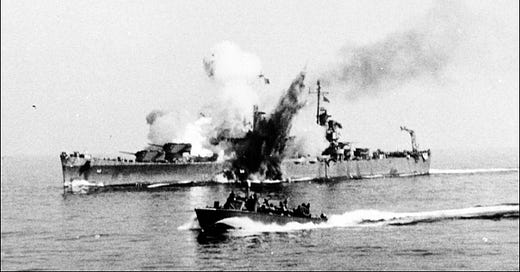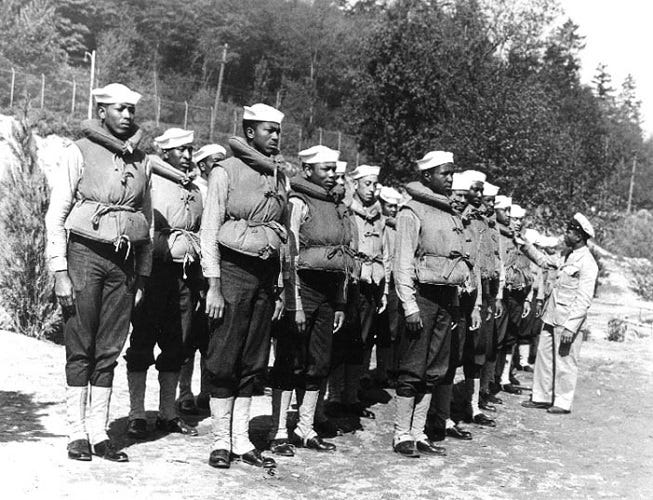
Democratic vice presidential nominee Tim Walz would like you to believe that his military service is a solid credential—despite the fact that he bailed when his National Guard unit was summoned to active duty. Well, that claim put me in mind of a gentleman of the greatest generation whom I met and later wrote about. Mr. Charles had better reasons than Walz to dodge the call of duty. But unlike him he stepped up and served his country. Here’s my memoir of him.
If you’ve ever been a teacher, you probably remember certain students who made it all worthwhile. For in truth teaching can be grind, sometimes dispiriting, and the dedication necessary to teach well can be hard to maintain. But every now and then a student comes along who cancels the fatigue and cynicism. I’ve been fortunate enough to encounter several such students, but one in particular made a most profound impression on me, and I’d like to tell you something about him.
In the mid-1990s I was making a precarious living as a freelance business writer, and to earn a few extra dollars I taught one or two courses per semester at a small college in southwestern Michigan. This institution was the reverse of elite; it catered mostly to the sons and daughters of the working class, GI Bill veterans, married women and single mothers whose kids were now in school, etc. Many of them were people from humble and often disadvantaged backgrounds, seeking to better themselves by acquiring a college education. I could relate. My own degrees were only made possible by the Vietnam-era GI Bill, and in fact I was the first person in my family to graduate from college.
My subject was history; usually I would teach one unit of Western Civilization and one unit of US History per semester. These classes were divided in two: WC I & WC II; US I & US II. It was during one spring semester, teaching US II, that I met Mr. Charles.
That was not his real name, but it’s close enough. Mr. Charles was a black man in his early seventies, originally from Georgia, certainly the least traditional of the nontraditional students who came my way. His presence in class piqued my curiosity and I took the opportunity of the one-on-one interview I conducted with all my students at the beginning of the semester to ask him, tactfully I hope, what he was doing in US II.
Mr. Charles took my question in good part. He explained to me that as a young man he’d never graduated from high school: His family was poor and it was necessary for him to go to work at the age of fifteen. But he served in the Navy in the Second World War, and in the late Forties he’d taken advantage of veterans’ preference to land a job with the US Postal Service. In mid-Fifties he’d earned his GED, the rough equivalent of a high school diploma. He retired in the late Eighties and now, as a widower, he’d decided to take some college courses. Mr. Charles explained that he hardly expected to earn a degree but thought that his mother and father, God rest their souls, would be proud to know that their son had lived to sit in a college classroom.
As the son of a Second World War veteran—my dad served in the US Coast Guard— and as a veteran of the Vietnam War, I felt privileged to have Mr. Charles in my class that semester. And when he came to me with his problem about the final exam I’d assigned, it was a difficult moment. The final was a paper of six to eight typed pages on a subject drawn from the list I’d provided: nothing too arduous. But Mr. Charles confessed that he didn’t feel equal to the task. He was not at all illiterate; he could read and write; but nothing in his education had prepared him for the demands of the final exam I’d set for the class.
Well, there was no way in hell that I was going to penalize the old gentleman, a fellow veteran who, like my father, had served in the war that saved the world, for his inability to deal with the final assignment I’d set. On the other hand, I shrank from humiliating this good man by just giving him a pass. But fortunately, inspiration struck. I proposed to Mr. Charles that in lieu of writing a paper he might make a presentation to the class, relating his experiences in the Navy during the war. We would arrange it as an interview: I would get the ball rolling by asking a few questions and his fellow students would be invited to follow suit. He thought this over for a minute, then agreed to give it a try.
The presentation made by Mr. Charles, supplemented by photographs and other memorabilia that he brought to class, was an extraordinary event. He told how he enlisted in the Navy in the spring of 1942 and after training was assigned as a steward’s mate aboard the light cruiser USS Savannah. He and his fellow black sailors were essentially servants, catering to the ship’s officers. But the steward’s mates also had assigned battle stations, including one of the ship’s twin 5-inch gun mounts, which they called, unofficially, Harlem One.
Mr. Charles and his shipmates were manning Harlem One on 11 September 1943 during the invasion of Salerno, Italy. On that day a Fritz X guided bomb launched from a German bomber struck the Savannah, knocking a main battery gun turret out of action and killing 197 members of the crew. Mr. Charles described this battle, his baptism of fire, in a quiet voice with downcast eyes, sparing us no detail of the terrible things he witnessed.
Then I invited questions from his fellow students. They were incredulous, indignant, at his account of the overt racism and segregation that characterized American society and the US Navy in those days. Mr. Charles, though, shrugged it off, remarking that back then segregation was a fact of life—adding humorously that if the Savannah had been sunk, everyone would have drowned together, officers and sailors and Marines, black and white, rank and segregation notwithstanding. When Mr. Charles spoke the word shipmates we all, I think, sensed the mystic quality with which he endowed it. At that moment I was reminded of my father, telling stories of convoy duty aboard a weather-beaten Coast Guard cutter in the North Atlantic.
I don’t think that any of us who were present in the classroom that day have ever forgotten Mr. Charles. In his self-possession, his refusal to accept the victim’s mantle, he was, as the saying goes, a class act. And at the end of the semester, more than one of his fellow students told me how much his presentation had impressed and moved them.
Mr. Charles received a well-earned B+ on his final assignment, for which he did not neglect to thank me. But that was the end of our relationship: Over the summer I landed a full-time job at an advertising agency and never returned to teaching at that college. He may well have passed away by now, as so many of his fellow veterans of the Second World War have done. Mr. Charles lives in my memory, though, as the student who taught me some lessons about courage and modesty and good humor that I treasure to this day.




I have a lump in my throat like I get when speaking about my Nam Vet companions who have died.
Well done, Mr. Charles. And eternal thanks.